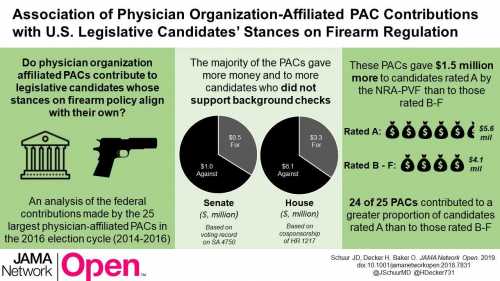
25 Feb How Do Physician-Affiliated PACs Vote on Gun Laws?
MedicalResearch.com Interview with:

Hannah Decker
Hannah Decker
MD Candidate, Class of 2019
Emory School of Medicine

Dr. Jeremiah Schuur
Jeremiah Schuur, MD, MHS FACEP
Physician-in-chief for emergency medicine at Lifespan and Chair of the department of Emergency Medicine
Brown
MedicalResearch.com: What is the background for this study? What are the main findings?
Response: Firearm injury is a leading cause of injury and death in the United States. Many physician groups advocate for evidence-based policies, such as universal background checks, to reduce this morbidity and mortality.
We studied contributions of the 25 largest political action committees (PACs) affiliated with physician professional groups during the 2016 election cycle and found that almost all gave more money to political candidates who voted against universal background checks and were endorsed by the NRA.
These PACs contributed to more than twice as many incumbent US Senate candidates who voted against an amendment to expand firearm background checks than those who voted for the amendment. In the US House of Representatives, the pattern of giving was similar. These PACs gave $2.8 million more to candidates who did not sponsor a bill to expand background checks than to those who did. Finally, these physician PACs were more than twice as likely to contribute to and gave almost $1.5 million dollars more to candidates rated A by the NRA.
MedicalResearch.com: What should readers take away from your report?
Response: PACs affiliated with physician groups – including those who provide frontline care for victims of gun violence – are contributing to candidates who are blocking evidence-based firearm safety policies.
This research highlights an opportunity for physicians to be more effective advocates for our patients. If physicians’ organized political giving doesn’t match their stated public health goals, they undermine the moral authority and scientific credibility they draw upon when advocating for policy change. Indirectly, these contributions may actually undermine the health and safety of their patients.
MedicalResearch.com: What recommendations do you have for future research as a result of this work?
Response: This study highlights correlation, not causation. We do not believe that physician group PACs contribute to candidates because of their stance on firearm policies. Rather, physician PACs consider many different factors when deciding what contributions to make, including malpractice reform, physician payment policies, and more. Future research could be done to evaluate contributions over time, as the giving patterns may change depending on the key issues most important to the physician PACs as well as the political composition of the legislative branch.
We have no disclosures to report.
Citation:
[wysija_form id=”3″]
[last-modified]
The information on MedicalResearch.com is provided for educational purposes only, and is in no way intended to diagnose, cure, or treat any medical or other condition. Always seek the advice of your physician or other qualified health and ask your doctor any questions you may have regarding a medical condition. In addition to all other limitations and disclaimers in this agreement, service provider and its third party providers disclaim any liability or loss in connection with the content provided on this website.
Last Updated on February 25, 2019 by Marie Benz MD FAAD

